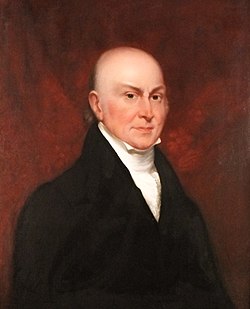📖 Presidential Profile
Comprehensive overview of leadership, policies, and historical significance
📋 Biography & Political Journey
Early Life and Diplomatic Career
John Quincy Adams was born on July 11, 1767, in Braintree, Massachusetts, to John and Abigail Adams. From an early age, he was exposed to the world of politics and diplomacy, accompanying his father on diplomatic missions to Europe. Adams received an exceptional education, studying at Harvard University and becoming fluent in multiple languages including French, Dutch, German, and Russian.
His diplomatic career began at age 14 when he served as secretary to the American minister to Russia. Adams later served as minister to the Netherlands, Prussia, Russia, and Great Britain, gaining extensive experience in international relations. His crowning diplomatic achievement came as chief negotiator of the Treaty of Ghent in 1814, which ended the War of 1812 between the United States and Britain.
As Secretary of State under James Monroe from 1817 to 1825, Adams was instrumental in formulating the Monroe Doctrine, which declared the Western Hemisphere off-limits to European colonization. He also negotiated the Adams-Onís Treaty with Spain in 1819, which acquired Florida for the United States and established the western boundary of the Louisiana Purchase.
Presidential Administration and Policies
Adams became president in 1825 after a contentious election that was decided by the House of Representatives, as no candidate received a majority of electoral votes. His presidency was marked by ambitious domestic programs focused on internal improvements, scientific advancement, and education. He proposed the establishment of a national university, an astronomical observatory, and extensive road and canal systems.
Despite his grand vision for America’s development, Adams faced fierce opposition from Congress, particularly from supporters of Andrew Jackson who felt the election had been stolen from their candidate. His administration struggled to implement many of its initiatives due to this political gridlock. Adams was a strong opponent of slavery and believed the federal government should take an active role in promoting economic development and scientific progress.
Controversial Decisions and Opposition
The most significant controversy of Adams’ presidency stemmed from the “corrupt bargain” accusation following the 1824 election. When Adams appointed Henry Clay as Secretary of State after Clay’s support helped him win the presidency in the House, opponents claimed the two had made a deal to steal the election from Andrew Jackson. This allegation, though never proven, severely damaged Adams’ political standing and effectiveness.
Adams also faced criticism for his support of federal funding for internal improvements and scientific projects, which opponents viewed as unconstitutional federal overreach. His proposal to send delegates to a conference of Latin American nations was attacked as potentially entangling the United States in foreign affairs, reflecting the isolationist sentiment of the era.
The Naked Swimming President
One of the most amusing stories about John Quincy Adams involves his daily swimming routine in the Potomac River. The president regularly swam naked in the river at 5 AM each morning, considering it essential for his health and mental clarity. Legend has it that journalist Anne Royall once sat on his clothes while he was swimming and refused to leave until he granted her an interview, making her possibly the first woman to interview a sitting president. While the exact details of this story are debated by historians, Adams’ love for early morning nude swimming in the Potomac is well-documented and reflected his belief in the benefits of physical exercise and connection with nature.
Humor & Jokes
Adams' Post-Presidency
After being president, Adams served in Congress for 17 years. Career demotion that turned into…
Read More →Greatest Wins
⚖️ Defending the Amistad Captives Before the Supreme Court
At age 73, former President Adams argued brilliantly before the Supreme Court, securing freedom for…
Read More →Epic Fails
🤝 The Corrupt Bargain: Clay's Appointment as Secretary of State
Adams appointed Henry Clay as Secretary of State after Clay's crucial support in the House…
Read More →